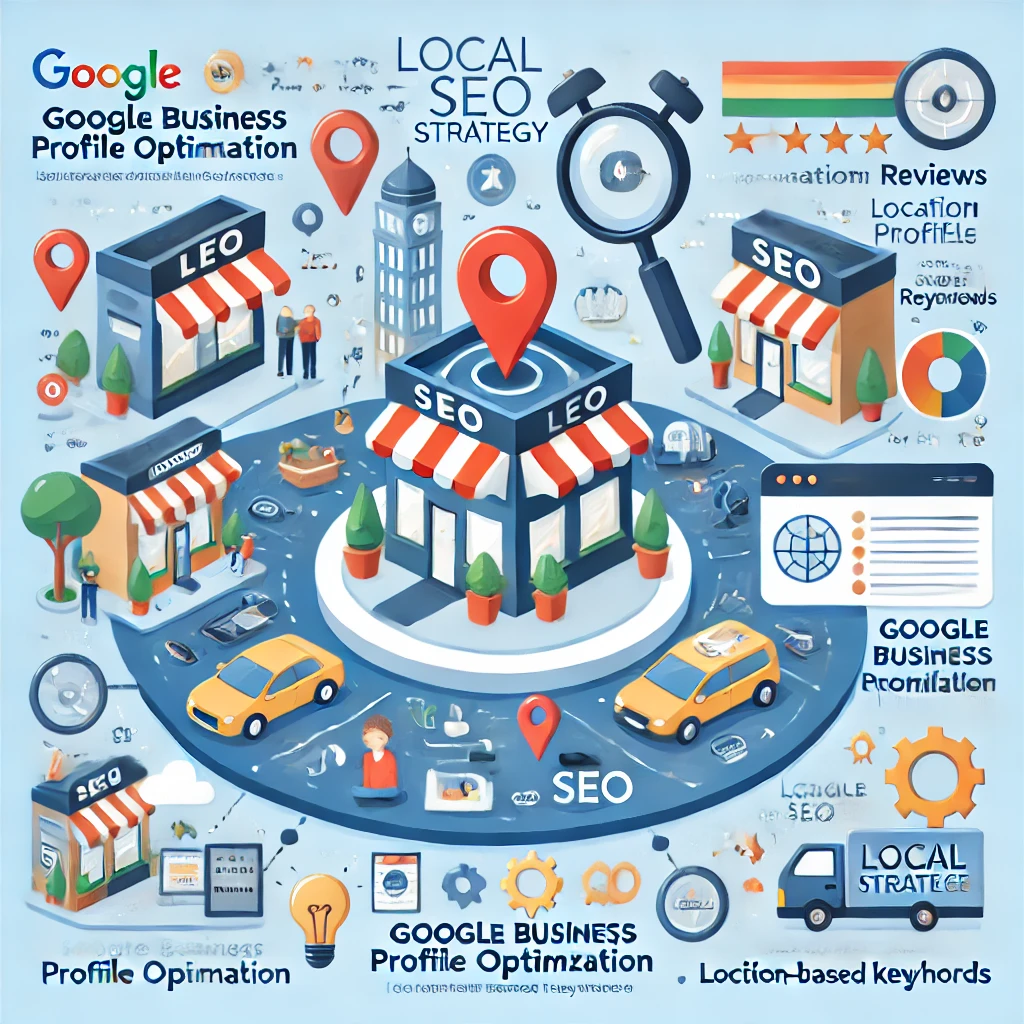
Website Mistakes That Hurt Your Business – 5 Critical Errors to Avoi
January 17, 2025
Choosing the Right Domain Name for Your Business
January 31, 2025Introduction
For small businesses, competing with big brands can feel overwhelming. Large corporations have massive marketing budgets, dedicated SEO teams, and strong brand recognition. However, SEO (Search Engine Optimisation) can help small businesses compete by levelling the playing field. By using the right strategies, small businesses can increase their online presence, attract local customers, and rank higher on search engines without needing a huge budget.
This article explores how SEO can help small businesses compete effectively against larger competitors by focusing on smart, cost-effective strategies that drive organic traffic and improve search rankings.
Table of contents
- Introduction
- 1. Local SEO – How Small Businesses Can Rank Higher in Their Area
- 2. Keyword Optimisation – How to Compete for Relevant Searches
- 3. Content Marketing – How Small Businesses Can Build Authority and Trust
- 4. Mobile Optimisation – Ensuring a Great User Experience
- 5. Link Building – How Small Businesses Can Boost Domain Authority
- Conclusion
1. Local SEO – How Small Businesses Can Rank Higher in Their Area
Why It’s Important
Local SEO is one of the most powerful ways SEO can help small businesses compete with big brands. Since 46% of Google searches have local intent, ranking high in local search results helps small businesses attract nearby customers.
How to Improve Local SEO
- Optimise Google Business Profile (GBP) – Ensure your business listing is complete, accurate, and regularly updated.
- Use local keywords – Include location-specific keywords in page titles, meta descriptions, and content.
- Encourage customer reviews – Positive Google reviews improve credibility and rankings.
- Build local citations – List your business on directories like Yelp, Trustpilot, and industry-specific sites.

2. Keyword Optimisation – How to Compete for Relevant Searches

Why It’s Important
Effective keyword optimisation is key to how SEO can help small businesses compete. By targeting long-tail keywords, small businesses can rank for less competitive search terms and reach the right audience.
How to Optimise Keywords
- Focus on long-tail keywords – Instead of targeting “shoes,” use “affordable running shoes for beginners.”
- Use keywords naturally – Avoid keyword stuffing and prioritise readability.
- Optimise headings and subheadings – Include relevant keywords in H1, H2, and H3 tags.
- Use structured data – Enhance search visibility with schema markup.
3. Content Marketing – How Small Businesses Can Build Authority and Trust
Why It’s Important
Content marketing is another powerful way SEO can help small businesses compete with big brands. High-quality content helps small businesses establish authority and trust, driving organic traffic and customer engagement.
How to Create SEO-Optimised Content
Blog consistently – Publish valuable, industry-specific content that addresses common customer questions.
Use internal linking – Link to relevant pages within your website to boost SEO.
Incorporate multimedia – Use images, videos, and infographics to enhance content engagement.
Optimise for featured snippets – Answer common questions concisely to appear in Google’s featured results.

4. Mobile Optimisation – Ensuring a Great User Experience
Why It’s Important
With over 60% of online traffic coming from mobile devices, SEO can help small businesses compete by ensuring their websites are mobile-friendly. Google uses mobile-first indexing, meaning mobile usability directly affects search rankings.
How to Optimise for Mobile SEO
- Use responsive design – Ensure your website adapts to different screen sizes.
- Improve page speed – Compress images, minify CSS/JavaScript, and use caching.
- Avoid intrusive pop-ups – Google penalises websites with disruptive pop-ups.
- Test usability – Use Google’s Mobile-Friendly Test to identify issues.
5. Link Building – How Small Businesses Can Boost Domain Authority
Why It’s Important
Backlinks from authoritative websites increase credibility and improve search rankings. SEO can help small businesses compete by using smart link-building strategies to gain visibility.
How to Build High-Quality Links
- Guest posting – Publish articles on industry-related blogs with backlinks to your site.
- Local partnerships – Collaborate with businesses and get listed on their websites.
- Submit to directories – List your business in relevant online directories.
- Create shareable content – Infographics, research reports, and case studies attract backlinks.

Conclusion
SEO provides small businesses with an opportunity to compete with big brands by improving visibility, credibility, and user experience. By focusing on local SEO, keyword optimisation, content marketing, mobile usability, and link building, small businesses can attract customers, rank higher in search results, and grow sustainably.
🚀 Need help implementing SEO strategies?






